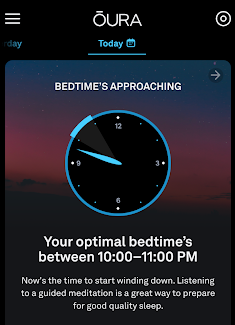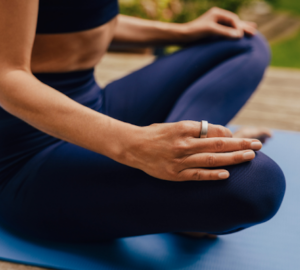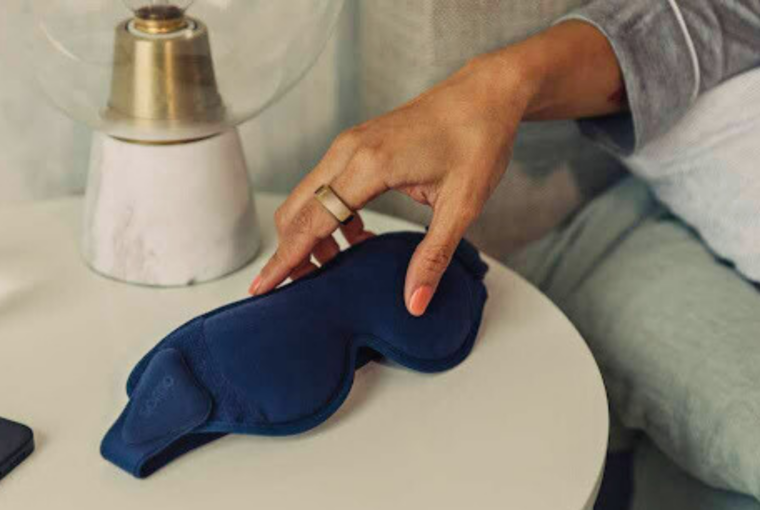- Taking time to wind down before bed can improve your sleep latency (how long it takes you to fall asleep) and your overall Sleep Score.
- Plenty of science-backed habits can help you to wind down in the evening — try taking a warm bath, drinking herbal tea, reading a novel, or listening to a meditation in the Oura App.
- Avoid stimulating or stressful activities like scrolling social media, watching an emotional movie, or eating too late.
To prepare your mind and body for a good night’s sleep, it’s crucial to take time to wind down before bed. Oura members can create their own ideal wind-down routine by tagging habits like evening sunlight, reading before bed, or white noise to see how they’re associated with sleep quality.
Why Wind Down Before Bed?

Winding down can help support your natural circadian rhythm, your internal body clock that signals to your body it’s time for sleep. For instance, when it starts to get darker outside, your brain sends a signal to release melatonin, the sleep hormone.
Consistency in your sleep timing reinforces the synchronization between internal and external sleep cues (like darkness), enabling your body to anticipate and prepare for sleep or wakefulness accordingly.
A relaxing wind-down routine can also help lower levels of cortisol, the stress hormone. Lower cortisol levels have been associated with better sleep quality, while higher cortisol levels can lead to frequent wakeups during the night, delayed latency, lower sleep efficiency, and less deep sleep.
Contrary to popular belief, not all sources of stress are bad. Excitement or arousal caused by a scary or emotional movie can show up as stress in your body. That’s why it’s key to avoid highly stimulating activities right before bed, as well.
| Member Story: With Oura, Nicole V. saw that her Sleep Score was consistently low when she worked until midnight. By stopping work at 9:30pm, she found she was able to fall asleep more easily, get better sleep, and be more productive during the day. |
LEARN MORE: Everything You Need to Know About Melatonin
14 Research-Based Ways to Wind Down Before Bed
1. Read a book.
A randomized controlled trial found that reading a book in bed before going to sleep improved sleep quality. Lying in bed to read allows you to physically slow down, and reading a book rather than watching a screen helps you avoid melatonin-suppressing blue light.
Plus, it’s not just the blue light: scrolling on social media or watching stimulating videos can heighten your emotions and increase brain activity, keeping you awake. Opt for a light-hearted novel — in old-fashioned print, ideally — instead.
2. Drink herbal tea.
While an alcoholic nightcap may help you feel sleepy, it will also impact your overall quality of sleep.
Decaffeinated herbal teas, especially flavors like chamomile, passionflower, and lemon balm, are better choices to promote relaxation. Much like a warm bath, drinking warm tea can help to facilitate the body temperature rise and fall which helps your body know it’s time for sleep.
Plus, certain herbal teas contain compounds that have been shown in research to have a beneficial relationship with sleep onset. For instance, one study found that chamomile decreased sleep latency by 16 minutes.
READ MORE: 9 Science-Backed Herbs and Supplements for Better Sleep
3. Go for an evening stroll.
Not only have studies shown that walking improves sleep quality, but an evening walk in particular may help you successfully wind down. Walking at a leisurely pace can relieve stress and rumination, partly by releasing serotonin, a precursor to melatonin.
| Member Story: Jussi L. realized that his evening gym session was linked to lower-quality sleep and lower heart rate variability (HRV). Instead, he now opts for an evening stroll after dinner. |
4. Adjust the lights.
Your internal clock is mediated by light. The bright blue light coming from your phone screen, computer, or TV, is not the only light to consider. Bright overhead lights in your house can also interfere with melatonin production and extend your sleep latency. Once evening approaches, opt for lamps instead of overhead lights, use warmer light bulbs (orange or red), and avoid screens.
5. Practice breathing exercises.
During the day, you tend to breathe faster and more shallowly. When you’re asleep, your respiratory rate slows down, as you take slow, deep breaths.
You can mirror this by intentionally breathing into your abdomen and releasing it slowly. Studies show this can increase melatonin production, improve parasympathetic tone (a rest-and-digest state!), and promote relaxation.
| Member Tip: You can follow guided breathing exercises designed to help you wind down, straight from the Oura App. Tap the (☰) menu in the upper left-hand corner of the Home screen to access Explore content. |
READ MORE: 10 Simple Breathing Exercises for Sleep and Relaxation
6. Follow a guided meditation.
One of the goals of meditation is to calm the mind and ground the body. Studies have shown that meditation helps you move into a parasympathetic state, to facilitate a smoother transition into the sleep state.
There are various types of meditation: non-sleep deep rest (NSDR), mindfulness meditation, progressive muscle relaxation, and more. Try a couple of different styles and see what works best for you.
READ MORE: Try Oura’s Guided Sleep Meditations for Deep and Restful Sleep
7. Take a warm bath or shower.

Studies have shown that bathing in hot water before bed is associated with significantly shorter sleep latency, making it an ideal component of a wind-down routine. This happens because it elevates your body temperature, then causes your body temperature to lower — mimicking what happens naturally as your body prepares for sleep. Additionally, warm water can ease muscle tension and decrease sympathetic arousal, conducive to sleep.
According to a systematic review, the ideal bedtime bath should have a water temperature of 104 to 109°F (40 to 43°C) and should be taken about 90 minutes before bed.
LEARN MORE: Not Sleeping Well? Try Taking a Warm Bath
8. Try a visualization exercise.
Visualization exercises give you something to focus on without making you feel stimulated. By engaging all your senses in a relaxing way, it eases tension mentally and physically.
Below is an example from sleep expert Michael Breus, PhD:
Imagine you are a sponge lying in a pool of warm water. Pretend that the pores of your body are like the pores of the sponge. As you breathe in, you are drawing in this warm, relaxing water through every pore of your body. Feel the warmth penetrate your skin. As you breathe out, the water is soaking into every pore of your body. Focus on the feelings of heaviness and warmth. Continue breathing in and out, letting the “water” fill in all the nooks and crannies.
9. Get cozy.
The concept of hygge is a Nordic practice that centers around creating warmth, comfort, and safety in your internal and external environment. While there haven’t been any studies on the benefits of hygge for sleep, the practice and rituals of getting cozy might help you feel more present, lower stress, and feel more content — all of which are factors that help you sleep well.
10. Cuddle up with a loved one — human or four-legged.
Cuddling, hugging, or spending time with loved ones (pets count!) in close contact downregulates your stress system, lowers blood pressure, and gives you a boost of oxytocin, dopamine, and serotonin. This can help you wind down and let go of the day, improving sleep.
11. Stretch it out.
Maybe you spent your day at a desk, hunched over your laptop, or perhaps you were on your feet all day – either way, your body withstands prolonged pressure. This can cause tight muscles, tension, and even pain, which impacts your sleep. The gentle and deliberate movements of stretching promote better blood circulation and oxygen flow, allowing the body to transition into a state of relaxation and ease. Try out these wind-down stretches for better sleep.
12. Turn skincare into a relaxing routine.
Your skincare routine can be relaxing — if you do it intentionally. Slow down your steps and try to be fully present as you apply your products. Just 10 minutes will do the trick: studies have shown that brief mindful meditations offer benefits for stress and emotional regulation.
13. Try journaling, drawing, or doodling.
As you wind down, journal about something you’re grateful for, or write a short to-do list for the next day. If writing isn’t for you, try drawing or doodling. Studies have found that doodling can be soothing: it’s a release for stress and anxiety, and can increase happiness and relaxation.
14. Listen to a relaxing podcast, audiobook, or music.
Opt for books or podcasts that are designed for sleep, so that the topic is relaxing rather than stimulating. Similarly, when choosing music, opt for slow tempos and gentle rhythms. This has been shown in research to reduce physiological arousal and lower stress.
RELATED: How Sleeping Background Noise Can Impact Your Sleep Quality




